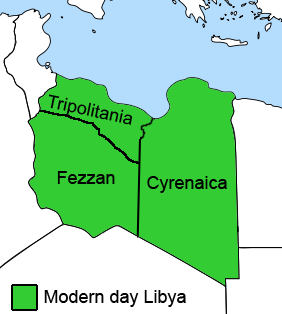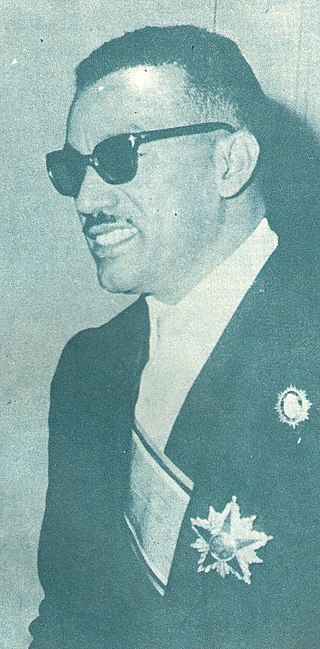| |||||
| Decades: | |||||
|---|---|---|---|---|---|
| See also: | Other events of 1963 List of years in Libya | ||||
| |||||
| Decades: | |||||
|---|---|---|---|---|---|
| See also: | Other events of 1963 List of years in Libya | ||||

Libya, officially the State of Libya, is a country in the Maghreb region of North Africa. It borders the Mediterranean Sea to the north, Egypt to the east, Sudan to the southeast, Chad to the south, Niger to the southwest, Algeria to the west, and Tunisia to the northwest, as well as maritime borders with Greece, Italy and Malta to the north. Libya comprises three historical regions: Tripolitania, Fezzan, and Cyrenaica. With an area of almost 1.8 million km2 (700,000 sq mi), it is the fourth-largest country in Africa and the Arab world, and the 16th-largest in the world. Libya claims 32,000 square kilometres of southeastern Algeria, south of the Libyan town of Ghat. The country's official religion is Islam, with 96.6% of the Libyan population being Sunni Muslims. The official language of Libya is Arabic, with vernacular Libyan Arabic being spoken most widely. The majority of Libya's population is Arab. The largest city and capital, Tripoli, is located in northwestern Libya and contains over a million of Libya's seven million people.

Muammar Muhammad Abu Minyar al-Gaddafi was a Libyan revolutionary, politician and political theorist who ruled Libya from 1969 until his assassination by rebel forces in 2011. He came to power through a military coup, first becoming Revolutionary Chairman of the Libyan Arab Republic from 1969 to 1977 and then the 'Brotherly Leader' of the Great Socialist People's Libyan Arab Jamahiriya from 1977 to 2011. Initially ideologically committed to Arab nationalism and Nasserism, Gaddafi later ruled according to his own Third International Theory.

Cyrenaica or Kyrenaika, is the eastern region of Libya. Cyrenaica includes all of the eastern part of Libya between the 16th and 25th meridians east, including the Kufra District. The coastal region, also known as Pentapolis in antiquity, was part of the Roman province of Crete and Cyrenaica, later divided into Libya Pentapolis and Libya Sicca. During the Islamic period, the area came to be known as Barqa, after the city of Barca.

In Libya there are currently 106 districts, second level administrative subdivisions known in Arabic as baladiyat. The number has varied since 2013 between 99 and 108. The first level administrative divisions in Libya are currently the governorates (muhafazat), which have yet to be formally delineated, but which were originally tripartite as: Tripolitania in the northwest, Cyrenaica in the east, and Fezzan in the southwest; and later divided into ten governorates.

The Libya national football team represents Libya in men's international association football and it is controlled by the Libyan Football Federation. The team has never qualified for FIFA World Cup but has qualified for editions of the Africa Cup of Nations in 1982, 2006, and 2012. In 1982, the team was both the host and runner-up. In the Arab Cup, Libya finished second in 1964 and 2012, and third in 1966. The team is affiliated with both FIFA and Confederation of African Football (CAF).

The Central Bank of Libya (CBL) is the monetary authority in Libya. It has the status of an autonomous corporate body. The law establishing the CBL stipulates that the objectives of the central bank shall be to maintain monetary stability in Libya and to promote the sustained growth of the economy in accordance with the general economic policy of the state.

Subdivisions of Libya have varied significantly over the last two centuries. Initially Libya under Ottoman and Italian control was organized into three to four provinces, then into three governorates (muhafazah) and after World War II into twenty-five districts (baladiyah). Successively into thirty-two districts (shabiyat) with three administrative regions, and then into twenty-two districts (shabiyat). In 2012 the ruling General National Congress divided the country into governorates (muhafazat) and districts (baladiyat). While the districts have been created, the governorates have not.

Muammar Gaddafi became the de facto leader of Libya on 1 September 1969 after leading a group of young Libyan Army officers against King Idris I in a bloodless coup d'état. After the king had fled the country, the Revolutionary Command Council (RCC) headed by Gaddafi abolished the monarchy and the old constitution and established the Libyan Arab Republic, with the motto "freedom, socialism and unity". The name of Libya was changed several times during Gaddafi's tenure as leader. From 1969 to 1977, the name was the Libyan Arab Republic. In 1977, the name was changed to Socialist People's Libyan Arab Jamahiriya. Jamahiriya was a term coined by Gaddafi, usually translated as "state of the masses". The country was renamed again in 1986 as the Great Socialist People's Libyan Arab Jamahiriya, after the United States bombing that year.

Al Ahli Tripoli Sports Club, also known as Al Ahli Tripoli, is a Libyan professional football club based in Tripoli. It is the second most successful Libyan club in history after Al-Ittihad, having won 13 Libyan Premier League titles, 7 Libyan Cups and 2 Libyan Super Cups.

Al-Ahly Sports Cultural and Social Club, known as Al-Ahly SCSC, is a Libyan sports club based in Benghazi. Al-Ahly SC has its roots in a political party, the Omar al Mukhtar society.

Mohieddin Fikini, last name also spelled Fekini, was the Prime Minister of Libya from 19 March 1963 to 22 January 1964. He was also the Minister of foreign affairs from 19 March 1963 to 22 January 1964.

Muhammad Osman Essed was a Libyan politician who held many positions in the era of the Kingdom of Libya including the Prime Minister of Libya from 17 October 1960 to 19 March 1963.

The Kingdom of Libya, known as the United Kingdom of Libya from 1951 to 1963, was a constitutional monarchy in North Africa that came into existence upon independence on 24 December 1951 and lasted until a bloodless coup d'état on 1 September 1969. The coup, led by Muammar Gaddafi, overthrew King Idris and established the Libyan Arab Republic.

The Libyan Army was the branch of the Armed Forces of the Libyan Arab Jamahiriya, the Libyan Arab Republic and the Kingdom of Libya responsible for ground warfare.
The 1992–93 Libyan Premier League was the 26th edition of the competition since its inception in 1963. 19 teams contested the league, with Ahly Benghazi the champions. There was no relegation as the league expanded to 21 teams the following season. The league went to a play off match between Tripoli rivals Ahly and Ittihad, as both were level on points after 36 games. Ahly Tripoli won 2–0 to win their 7th league title and their first for 9 years.

The Libyan civil war, also known as the First Libyan Civil War, was an armed conflict in 2011 in the North African country of Libya that was fought between forces loyal to Colonel Muammar Gaddafi and rebel groups that were seeking to oust his government. The war was preceded by protests in Zawiya on 8 August 2009 and finally ignited by protests in Benghazi beginning on Tuesday 15 February 2011, which led to clashes with security forces who fired on the crowd. The protests escalated into a rebellion that spread across the country, with the forces opposing Gaddafi establishing an interim governing body, the National Transitional Council.

On 19 March 2011, a multi-state NATO-led coalition began a military intervention in Libya to implement United Nations Security Council Resolution 1973, in response to events during the First Libyan Civil War. With ten votes in favour and five abstentions, the intent of the UN Security Council was to have "an immediate ceasefire in Libya, including an end to the current attacks against civilians, which it said might constitute 'crimes against humanity' ... [imposing] a ban on all flights in the country's airspace — a no-fly zone — and tightened sanctions on the Muammar Gaddafi regime and its supporters."

The Libyan civil war (2014–2020), also known as the Second Libyan Civil War, was a multilateral civil war which was fought in Libya among a number of armed groups, but mainly the House of Representatives (HoR) and the Government of National Accord (GNA), for six years from 2014 to 2020.
The ongoing COVID-19 pandemic was confirmed to have spread to Libya on 24 March 2020, when the first case was officially confirmed in Tripoli.